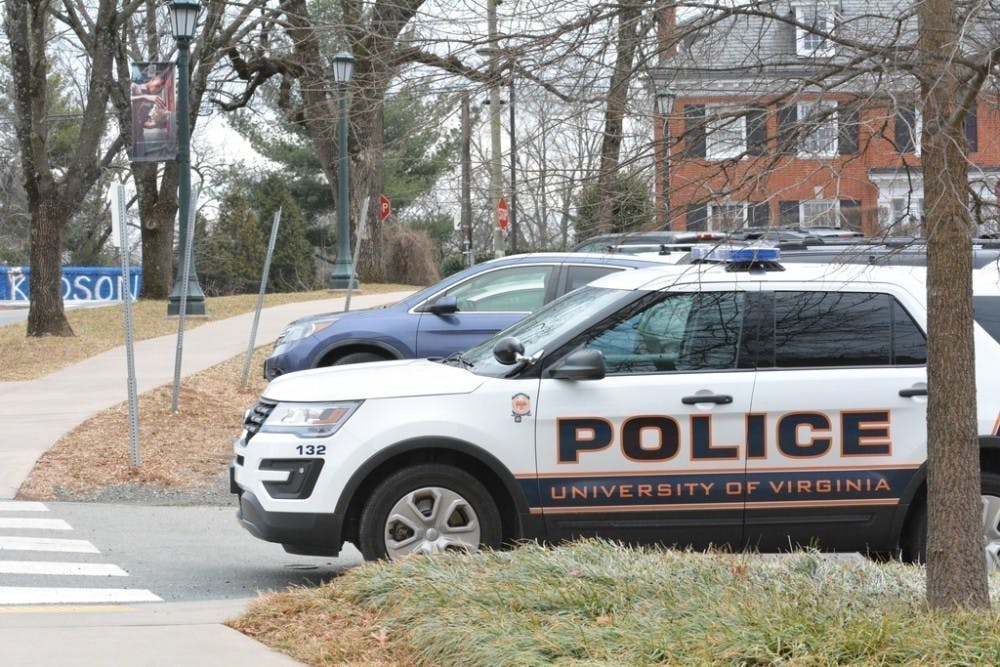中文版请点击此处
Recently, the University Police Department took action to create a more visible presence in the neighborhoods surrounding Grounds. For the most part, the catalyst for this response was rising concerns about violence on Grounds and in the surrounding Charlottesville community. The efforts seem to be genuine attempts for the police force to protect and connect with the community. Nevertheless, their intentions are misguided — the University should not increase police presence on Grounds nor in the surrounding community.
In order to become more involved with and knowledgeable of the community around Grounds, UPD has added a new unit to its force — the Community Oriented Policing Squad. This new unit will consist of four new police officers working with existing police officers in Charlottesville. The planned schedule is that COPS will work Wednesday through Saturday. Thursday through Saturday, COPS will patrol between the hours of 7 p.m. and 3 a.m. to gain a better understanding of the physical environment surrounding Grounds. Then, on Wednesdays, COPS will meet with “business owners, community stakeholders and student groups to engineer effective problem solving strategies, promote health and safety awareness and advance crime prevention initiatives.” They also plan to “participate in other outreach activities.” The principal goal of these efforts is to “[build] relationships, create a safe environment and provide for a more sustained police presence in those neighborhoods where students live, gather and integrate into the community.”
The efforts seem to be whole-heartedly genuine. Regardless, they come across as tone-deaf in response to the cries to defund the police that have echoed across America for the past year. In Charlottesville particularly, citizen groups, rallies and students alike have all demanded that police departments be defunded and that the resources be allocated elsewhere. Yet the irony is astounding — in response to clamors to defund the police, UPD has increased their policing presence. The time has come for police departments to start listening to those who they serve.
There are a multitude of valid reasons why those in the Charlottesville community would be dismayed by an increased police presence. Since their inception, police officers across the country have displayed a tendency toward a violent suppression of citizens. The police force was created to keep “middle-class and especially upper-class white people safe” and to “keep the social order safe from resistance or change.” They were willing to do so at the expense of abusing people of color and forcefully “silencing dissent.” The racist and classist history of police officers was designed as a part of the institution itself. The creation of COPS and its attempts to meet with local community members in Charlottesville is not a sufficient antidote to hundreds of years of systemic violence and oppression.
Furthermore, students and other residents of the Charlottesville community should not be expected to manage the responsibility of meeting with and working to improve the police force. Foremost, police are violent, particularly towards minority populations. This point is underscored by the alarming statistic that Black people are three times more likely than their white counterparts to be killed by police. Further, most police killings “begin with traffic stops, mental health checks, domestic disturbances, or reported low level offenses.” University and Charlottesville residents have no reason to trust the police. Nevertheless, the ambitions of the COPS program rely on healthy communication with the University and Charlottesville communities. This program would require residents to step outside of their comfort zone to openly communicate with officers — placing the onus on average people to remedy the fractured policing institution.
Yet another irony — while this program would depend on honest feedback, it has no reason to expect that residents will give candid responses. There is a clear power imbalance between officers and residents. Residents have explicit reason to fear police officers and incentives to hide their authentic discomfort with the program and the police force in general.
Before UPD places more officers into the community, they must first take action to display a commitment to anti-racism and support of the diverse residents that make up the University and Charlottesville communities. Many times over, police departments have been told of the public’s demands. For instance, the Human Rights Watch and the National Association for the Advancement of Colored People both have made specific demands for police reform. Before expecting community involvement, the UPD must make an effort to dismantle its history of discrimination and to show its community that their voices have been heard.
Jessica Moore is the Senior Associate Opinion Editor for The Cavalier Daily. She can be reached at j.moore@cavalierdaily.com.
The opinions expressed in this column are not necessarily those of The Cavalier Daily. Columns represent the views of the authors alone.







